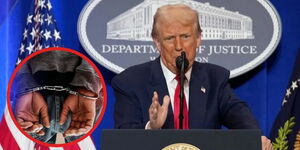Rolling back the years to the 90's, most businesses in Nairobi's CBD were owned by Kenyans of South Asian descent - Indians.
One street, in particular, stood out due to the variety of commodities available ranging from clothes, foodstuff, spare parts and interior decor.
Biashara Street is one of the few streets that has a countable number of Indian traders in Nairobi up to date.
Apparently, one businessman who is responsible for how Biashara Street later turned out; populated by Indian merchants, is the well-known colonial entrepreneur Alibhai Mulla Jeevanjee after whom Jeevanjee Gardens is named.
[caption caption="Jeevanjee Gardens"] [/caption]
[/caption]
According to his granddaughter Zarina Patel, Jeevanjee was rewarded with the land between the present day University Way and Biashara Street after he aided the British in constructing their residences, including the governor’s mansion.
Jeevanjee later built the new Indian Bazaar and his fellow Indians flocked the street including the wealthy family of the Chandarias.
Over the years, Biashara Street has slowly transformed and the Chinese have started to take over some of the businesses that were previously owned by Indians.
Samuel Owino, a guard who has worked for different retail shops along Biashara Street for more than 10 years, stated that the influx of Chinese businessmen came in the last five years.
“I have worked here both for Indians and Chinese guarding their shops. I started working for an Indian hotel owner in 2004. And I can tell you the change is real.
"These Chinese shops never used to be here. They have come in the last like five years.
"Now we have more Chinese people doing business,” Owino was quoted by the Standard.
[caption caption="Vintage Photo of Biashara Street"] [/caption]
[/caption]












